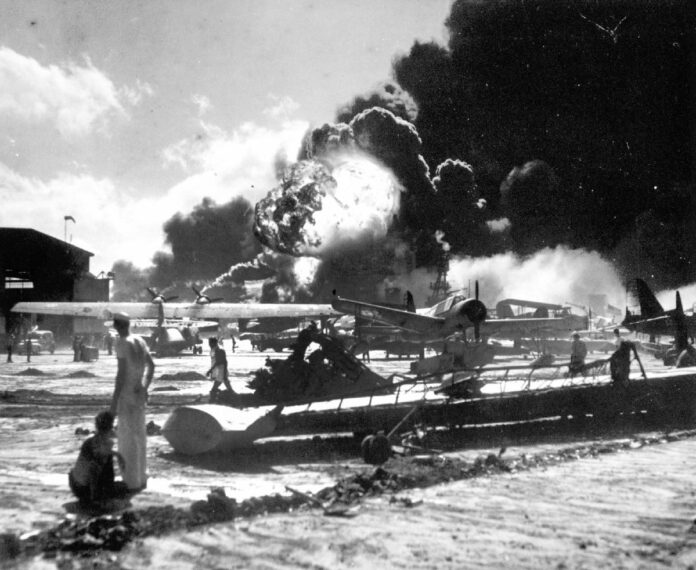Until 1941, America was reluctant to get involved in World War II. There were two vast oceans separating America from the warring countries, and the first “War to End All Wars” was still too fresh in everyone’s minds to forget.
Then, all Hell seemed to break loose. The Dec. 7, 1941, bombing of Pearl Harbor happened and Americans were outraged. Young men, many of them teenagers, volunteered in droves to stand in America’s defense.
We asked local World War II veterans and those on the home front for their thoughts about the attack and what it was like in the immediate aftermath. Here are their stories in their own words:
No radio
On Dec. 7, 1941, I was 13 years old when Pearl Harbor was bombed. We lived on Nolana and K Center Street, a quarter-mile west of where The Monitor is now. We did not have a radio or newspaper, but our neighbor, Mr. Joe Parks, told us about it. The next day, our friends who lived on Nolana M.P.R.R. (where Bicentennial now is located) had a battery radio and he came over to give us the news. That war was declared! I was only 13 but it was a very sad day. It will be embedded in my mind forever. — Eduardo Colegio
Movie interrupted
It was 3 p.m. on a Sunday afternoon and my 9-year-old sister, Marge, and I were at the movies in the Coed Theater in Topeka, Kansas. We were able to go see a movie and get a free Dr Pepper for all of 5 cents. All of the sudden, as we were enjoying our movie, our mother came hurrying into the movie to tell us we had to come home NOW, something terrible had just happened. Mother told us, on the way out of the Coed, that the “world” was in danger. The “dirty” Japs, had just invaded our country and we had to get home where it was safe. We lived in a basement apartment where she felt we would be safe from the enemy. — Rev. Max Grubb
What’s Pearl Harbor?
My mother and my brother, Donald, and my brother, Larry, and I moved down here from North Dakota in August of 1941. On Dec. 7, I was at a movie theater in Donna. The movie was “A Yank in the RAF.” My uncle, Roy Blackburn, picked me up about 3 o’clock and was taking me home to North Hutto Road and he was very quiet. I asked him why, if he was sick, and he said, “No, the Japanese just started bombing Pearl Harbor.” I was 11 years ago, and I didn’t know what Pearl Harbor was. I said when I get home I’m going to look it up myself. It was sad at home that evening. We kept getting reports. We had people from North Dakota visiting us over Christmas and we took them to the airport in Brownsville. There was already a machine gun nest set up on the entrance. Then, we understood what this war was all about. It wasn’t too long that mother got a job at the Valley Fruit Company in Pharr. She discovered that gasoline was being rationed and she would not have enough gas to go back and forth, so we moved to McAllen. Life really changed. People were much more serious. It seems like I grew up quite a bit. —Dorance Otto Hofland
Never the same
I remember one Sunday morning at a rural Iowa farm. I was standing by an open screen door watching my father working under a large tree with a tire swing. Mother called, “Go get your Dad quick. The Japs bombed Pearl Harbor.” I rushed out. Mom said, “Come quick. The Japs bombed Pearl Harbor.” Dad dropped tools and rushed back in the house to listen to the static radio. This is where we sat most of the day. Early the next morning, Dad drove my brothers Ed and Darrell to Des Moines to enlist in the Air Force. That night, they were shipped to California and to a ship overseas. No uniform, gun or training. We were at war. Blackouts. Vmail. Sugar stamps. One cold, winter day, standing on the church steps, listening to taps echo for my cousin. The 15-year-old farm girl would never again be the same. Quiet peace vs. America at war. — Peggy Wigen




